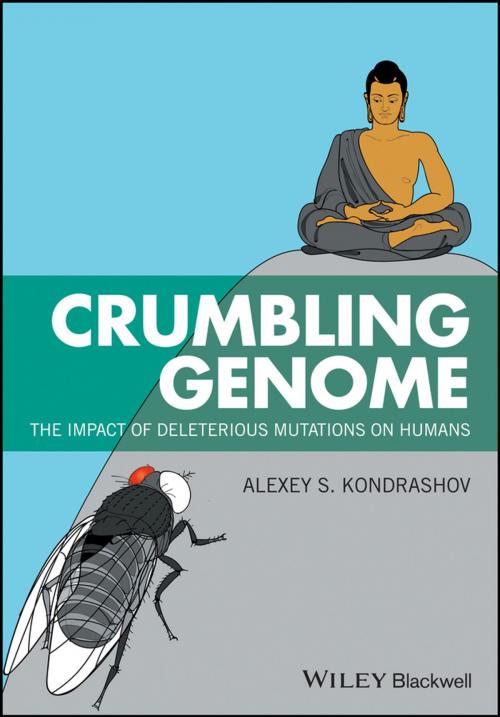Crumbling Genome
The Impact of Deleterious Mutations on Humans
Nonfiction, Science & Nature, Science, Biological Sciences, Evolution| Author: | Alexey S. Kondrashov | ISBN: | 9781118952139 |
| Publisher: | Wiley | Publication: | May 16, 2017 |
| Imprint: | Wiley-Blackwell | Language: | English |
| Author: | Alexey S. Kondrashov |
| ISBN: | 9781118952139 |
| Publisher: | Wiley |
| Publication: | May 16, 2017 |
| Imprint: | Wiley-Blackwell |
| Language: | English |
A thought-provoking exploration of deleterious mutations in the human genome and their effects on human health and wellbeing
Despite all of the elaborate mechanisms that a cell employs to handle its DNA with the utmost care, a newborn human carries about 100 new mutations, originated in their parents, about 10 of which are deleterious. A mutation replacing just one of the more than three billion nucleotides in the human genome may lead to synthesis of a dysfunctional protein, and this can be inconsistent with life or cause a tragic disease. Several percent of even young people suffer from diseases that are caused, exclusively or primarily, by pre9;]existing and new mutations in their genomes, including both a wide variety of genetically simple Mendelian diseases and diverse complex diseases such as birth anomalies, diabetes, and schizophrenia. Milder, but still substantial, negative effects of mutations are even more pervasive. As of now, we possess no means of reducing the rate at which mutations appear spontaneously. However, the recent flood of genomic data made possible by next-generation methods of DNA sequencing, enabled scientists to explore the impacts of deleterious mutations on humans with previously unattainable precision and begin to develop approaches to managing them.
Written by a leading researcher in the field of evolutionary genetics, Crumbling Genome reviews the current state of knowledge about deleterious mutations and their effects on humans for those in the biological sciences and medicine, as well as for readers with only a general scientific literacy and an interest in human genetics.
- Provides an extensive introduction to the fundamentals of evolutionary genetics with an emphasis on mutation and selection
- Discusses the effects of pre-existing and new mutations on human genotypes and phenotypes
- Provides a comprehensive review of the current state of knowledge in the field and considers crucial unsolved problems
- Explores key ethical, scientific, and social issues likely to become relevant in the near future as the modification of human germline genotypes becomes technically feasible
Crumbling Genome is must-reading for students and professionals in human genetics, genomics, bioinformatics, evolutionary biology, and biological anthropology. It is certain to have great appeal among all those with an interest in the links between genetics and evolution and how they are likely to influence the future of human health, medicine, and society.
A thought-provoking exploration of deleterious mutations in the human genome and their effects on human health and wellbeing
Despite all of the elaborate mechanisms that a cell employs to handle its DNA with the utmost care, a newborn human carries about 100 new mutations, originated in their parents, about 10 of which are deleterious. A mutation replacing just one of the more than three billion nucleotides in the human genome may lead to synthesis of a dysfunctional protein, and this can be inconsistent with life or cause a tragic disease. Several percent of even young people suffer from diseases that are caused, exclusively or primarily, by pre9;]existing and new mutations in their genomes, including both a wide variety of genetically simple Mendelian diseases and diverse complex diseases such as birth anomalies, diabetes, and schizophrenia. Milder, but still substantial, negative effects of mutations are even more pervasive. As of now, we possess no means of reducing the rate at which mutations appear spontaneously. However, the recent flood of genomic data made possible by next-generation methods of DNA sequencing, enabled scientists to explore the impacts of deleterious mutations on humans with previously unattainable precision and begin to develop approaches to managing them.
Written by a leading researcher in the field of evolutionary genetics, Crumbling Genome reviews the current state of knowledge about deleterious mutations and their effects on humans for those in the biological sciences and medicine, as well as for readers with only a general scientific literacy and an interest in human genetics.
- Provides an extensive introduction to the fundamentals of evolutionary genetics with an emphasis on mutation and selection
- Discusses the effects of pre-existing and new mutations on human genotypes and phenotypes
- Provides a comprehensive review of the current state of knowledge in the field and considers crucial unsolved problems
- Explores key ethical, scientific, and social issues likely to become relevant in the near future as the modification of human germline genotypes becomes technically feasible
Crumbling Genome is must-reading for students and professionals in human genetics, genomics, bioinformatics, evolutionary biology, and biological anthropology. It is certain to have great appeal among all those with an interest in the links between genetics and evolution and how they are likely to influence the future of human health, medicine, and society.















